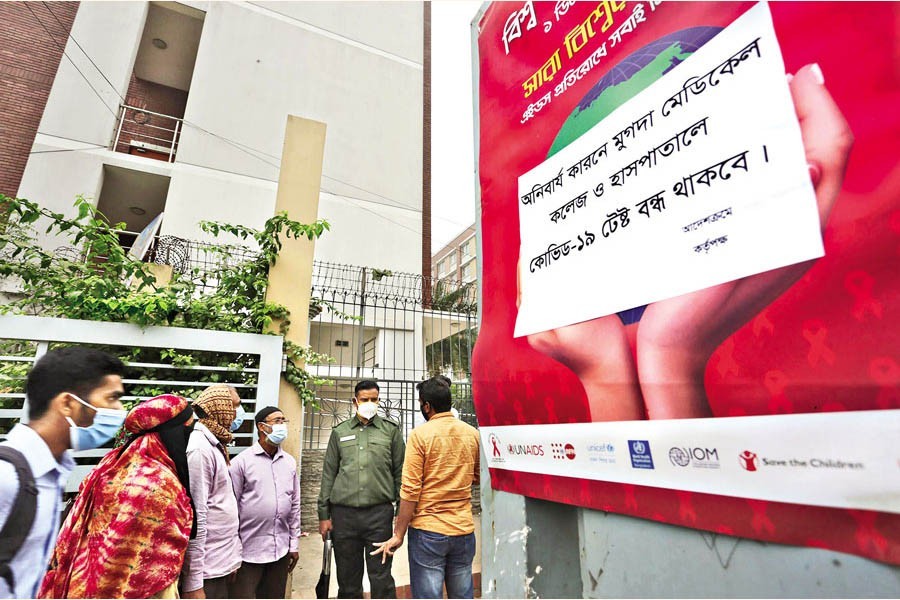The introduction of antigen-based kits for testing coronavirus has hardly made any visible progress in boosting the number of tests in the country even as both infections and fatalities from the virus surge, healthcare experts say.
This is why the extent of tests to detect coronavirus infections in the country remains at the lowest level in South Asia except for war-torn Afghanistan, though nine months have elapsed since the first case was reported.
In the last four days, only 360 rapid antigen tests were conducted in 10 districts while tests in RT-PCR labs hover on an average 15,000 a day, according to the state-controlled Directorate General of Health Services (DGHS).
Public health experts said mismanagement and the lack of monitoring by the government is to blame for the sluggish and lower number of tests.
Besides, they said, many people, especially with mild symptoms or no symptoms at all, are found reluctant to go through the hassle-ridden Covid-19 testing process at healthcare facilities.
Bangladesh was ranked 164 out of 220 countries and regions in terms of testing per million populations for Covid-19. As of December 10, testing per million populations stood at 17,603, according to worldometers.info.
On the contrary, the country was ranked the 26th position in terms of total number of infected population.
In India, tests per million populations are 108,112, Pakistan 26,334, Sri Lanka 42,780, Nepal 61,502, Bhutan 274,128 and Afghanistan 4,174.
Even neighbouring Myanmar is way ahead of Bangladesh with 24,392 tests per million population.
Talking about the number of tests, DGHS additional director general Nasima Sultana said samples are collected as per the presence of patients in healthcare facilities.
"If people don't come to get tested, how will the number of tests increase?" she questioned.
When asked about some labs running minimal or no tests, she said, the government hospitals have never stopped testing samples from the beginning, but some private facilities sometimes do not run their labs due to samples shortage.
"The government has given permission to private hospitals to test Covid-19 in their labs; now it is their decision whether they will increase the number of tests or not," she said.
About the lower number of antigen tests, she said, only individuals with symptoms will be tested, so the number of such testing will depend on the number of patients coming to healthcare facilities.
The antigen-based rapid testing is an easy-to-use molecular test--alternative to the sophisticated RT-PCR tests -- which detects the presence of the virus within 30 to 45 minutes.
Following recommendations from the National Technical Advisory Committee on Covid-19, the health services division of the health ministry on September 17 approved the antigen rapid testing kits.
After overcoming the long bureaucratic process, the government on December 05 commenced rapid antigen tests in 10 districts -- Panchagarh, Gaibandha, Joypurhat, Patuakhali, Meherpur, Munshiganj, Brahmanbaria, Jashore, Madaripur and Sylhet.
The Institute of Epidemiology, Disease Control and Research (IEDCR) has trained 10 physicians, 10 medical technologists and 10 statisticians to conduct the antigen tests in 10 districts.
Professor Dr Nazrul Islam, a member of the national technical advisory committee on Covid-19, said in a country with over 165 million population, the number of tests is still far below the expected level.
The number of daily tests should be increased to at least 25,000 a day from current 15,000 to 16,500 a day, said Islam, a former vice-chancellor of Bangabandhu Sheikh Mujib Medical University (BSMMU).
However, Dr Islam said since a significant number of people have lost trust in the country's healthcare system, many with mild covid-19 symptoms start taking home remedies instead of waiting in queue for testing.
More rapid tests should be done to encourage people with Covid-19 symptoms to go to hospitals for testing, he said.
In late August, health minister Zahid Maleque announced that the government had taken a decision on approving the antigen tests.
In October, the government announced that it was buying 200,000 antigen test kits.
Public health activist Dr Zafrullah Chowdhury regretted the government has preferred imported rapid test kits at higher prices than supporting local companies to develop the same at affordable prices.
Gonoshasthaya Pharmaceuticals Limited (GPL) applied for the registration of antibody and antigen test kits back in April, but the authorities concerned didn't approve the kits, he said.
In mid-June, the BSMMU found the Covid-19 rapid test kit developed by Gonoshasthaya ineffective.
As of December 09, some 484,104 cases have been identified with a death toll of 6,930 in the country. The current death rate stood at 1.43 per cent, while that of recovery was 83.86.


